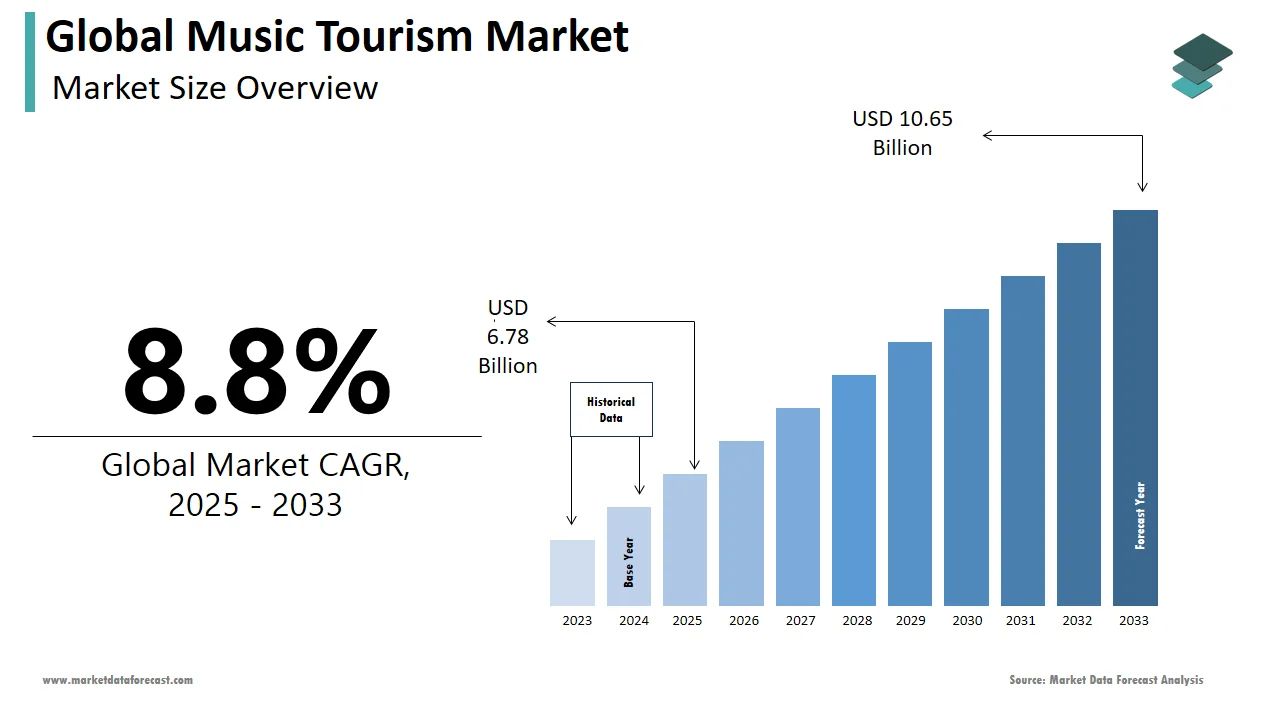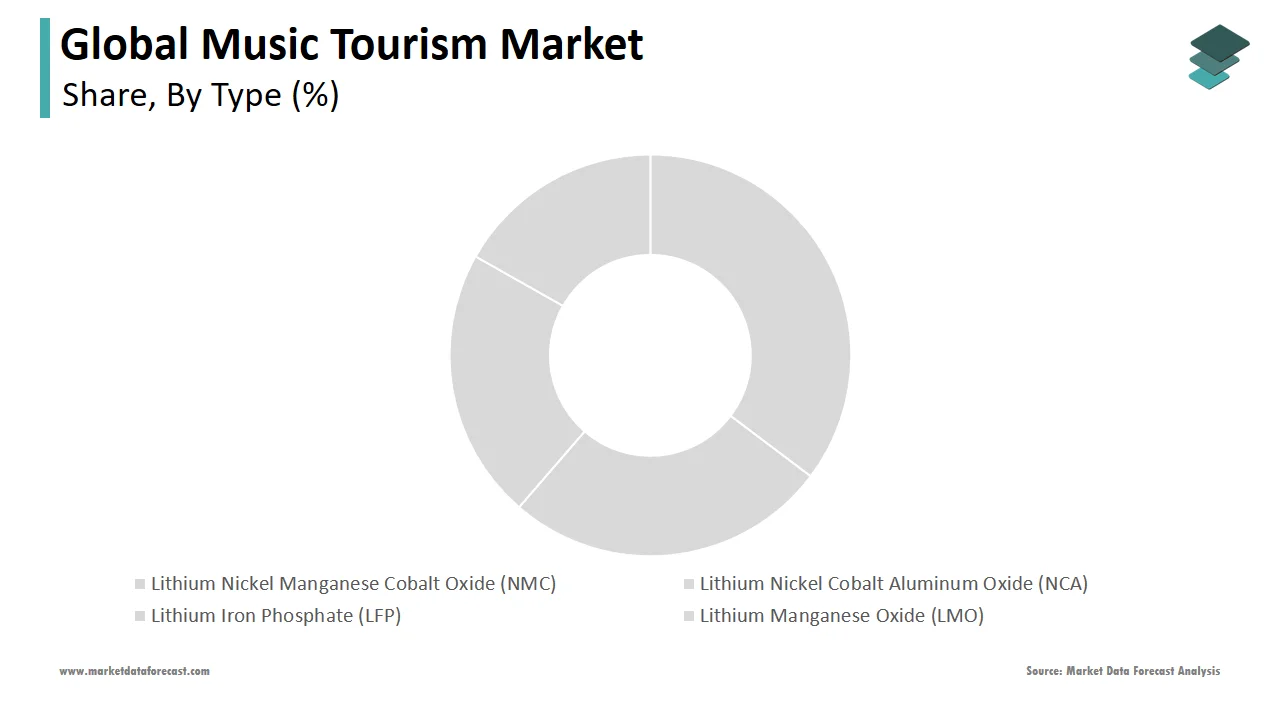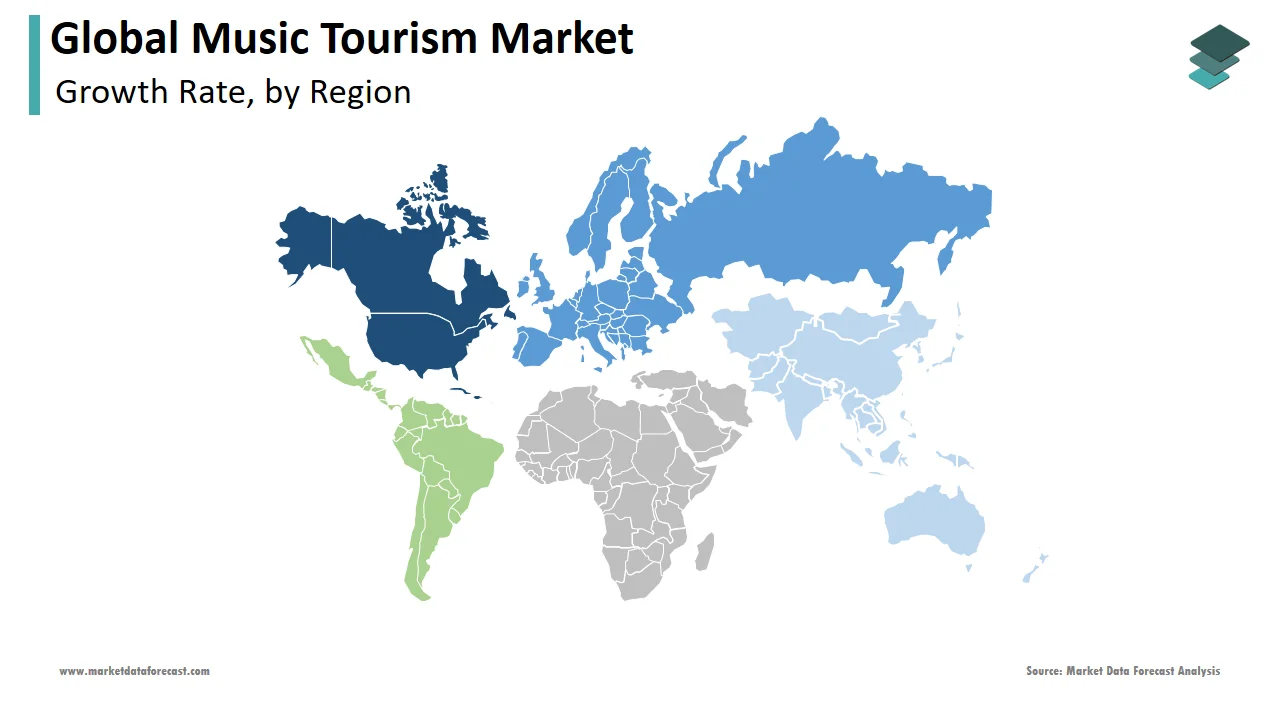Global Music Tourism Market Size, Share, Trends & Growth Forecast Report By Type (Local Music Tourism Fest, International Music Tourism Fest), By Tourist (Pay to Visit, Get Paid to Visit), By Industry Vertical (Music Tourism, Fashion Tourism, Food Tourism, Others), and Region (North America, Europe, Asia-Pacific, Latin America, Middle East and Africa), Industry Analysis From 2025 To 2033.
Global Music Tourism Market Size
The size of the global music tourism market was worth USD 6.41 billion in 2024. The global market is anticipated to grow at a CAGR of 8.8% from 2025 to 2033 and be worth USD 10.65 billion by 2033 from USD 6.78 billion in 2025.

Music tourism refers to the practice of travelling to different places, both near and far, to experience music-related events and destinations. It involves journeys to attend concerts, music festivals, and live performances by favourite artists or bands. People also explore cities and regions with rich musical histories, like Memphis for blues or Vienna for classical music. Music tourism also provides opportunities to visit famous music venues, landmarks, and museums dedicated to music legends. It's a way for music enthusiasts to connect with the cultural and artistic aspects of a location while enjoying the universal language of music. Whether it's attending a rock concert, dancing at a music festival, or exploring the birthplace of a musical genre, music tourism offers unique and enriching experiences for travellers who have a passion for music.
MARKET DRIVERS
The music tourism market is thriving due to the craving for exceptional live experiences.
People are flocking to concerts and music festivals to forge personal connections with their beloved artists, an irreplaceable sensation that digital streaming can't provide. The attraction lies in the chance to witness unforgettable performances, feel the music's energy, and create lasting memories. As a result, this hunger for live music encounters is a vital force behind the market growth of music tourism, and drawing enthusiasts from far and wide to venues around the world.
Social media and connectivity play a crucial role in driving the music tourism market. Travelers now have the power to instantly share their music-related adventures and concert experiences with a global audience through platforms like Instagram, Facebook, and Twitter. These shared moments not only serve as personal memories but also inspire others to embark on similar journeys, attend concerts, and explore new destinations. As a result, this connectivity and the ability to showcase the excitement of music tourism experiences contribute to the growth of the market as more people seek to join the fun and create their musical travel memories.
MARKET RESTRAINTS
The music tourism market faces significant challenges due to weather conditions.
Because unpredictable weather, such as rain or extreme heat, can disrupt performances and deter attendees. Also, it can limit the availability of music events in certain regions, which affects the overall music tourism market growth. These extreme weather events and natural disasters can lead to event cancellations and safety concerns for travellers. As a result, these weather-related challenges can hinder the overall market growth and accessibility.
MARKET OPPORTUNITIES
Music tourism has a significant opportunity to diversify its offerings and appeal to a broader range of music enthusiasts. By featuring various musical genres, from classical to electronic dance music, it can attract a diverse audience and offer more travel experiences. This approach allows travellers to explore different music scenes and attend events that align with their musical preferences. It not only broadens the market's reach but also fosters inclusivity, and ensures that music tourism remains an attractive option for a wider spectrum of travellers seeking unique and immersive music-related adventures.
IMPACT OF COVID-19 ON THE GLOBAL MUSIC TOURISM MARKET
The COVID-19 pandemic had a profound impact on the music tourism market. Concerts, music festivals, and live events around the world faced cancellations and postponements to prevent the spread of the virus. Travel restrictions, social distancing measures, and health concerns led to a decline in music tourism activities. Many artists turned to virtual performances, which, although a temporary solution, couldn't replicate the experience of live shows. However, as vaccination efforts progress and restrictions ease, the market is gradually recovering, but challenges remain. Event organizers are implementing safety measures, such as reduced capacities and testing requirements. Hybrid models, combining live and virtual elements, have emerged as a potential future trend. The post-pandemic landscape emphasizes the importance of adaptability and innovation in the music tourism industry.
REPORT COVERAGE
|
REPORT METRIC |
DETAILS |
|
Market Size Available |
2024 to 2033 |
|
Base Year |
2024 |
|
Forecast Period |
2025 to 2033 |
|
CAGR |
8.8% |
|
Segments Covered |
By Type, Tourist, Industry Vertical, and Region. |
|
Various Analyses Covered |
Global, Regional & Country Level Analysis, Segment-Level Analysis, DROC, PESTLE Analysis, Porter’s Five Forces Analysis, Competitive Landscape, Analyst Overview of Investment Opportunities |
|
Regions Covered |
North America, Europe, APAC, Latin America, Middle East & Africa |
|
Market Leaders Profiled |
Live Nation Entertainment, Ticketmaster, AEG Presents, C3 Presents, Eventbrite, StubHub, Vivid Seats, Festicket, Pollstar, Songkick, Bandsintown, Glastonbury Festival, and Others. |
SEGMENT ANALYSIS
By Type Insights

Local Music Tourism Fests dominate the market because they are accessible, affordable, and offer diverse music experiences. These festivals draw a wider audience due to their ease of attendance, cost-effectiveness, and the variety of genres they showcase. This accessibility and inclusivity contribute to their dominance in the music tourism market.
By Tourist Insights
The "Pay to Visit" tourist type dominates the music tourism market share. These paying attendees directly contribute to the revenue of music tourism destinations and events by purchasing tickets, merchandise, and concessions. Their financial support is essential for sustaining the festivals, supporting artists, maintaining infrastructure, and ensuring a high-quality experience for all participants. The success and planning of music events heavily rely on the revenue generated by these paying visitors, making them a dominant force in the market.
By Industry Vertical Insights
Music Tourism is likely dominating the music tourism market size due to its unique ability to inspire passion and fandom among enthusiasts. Fans often travel great distances to attend concerts and music festivals, making music tourism a powerful and dedicated niche with global appeal.
REGIONAL ANALYSIS

North America is likely to dominate the music tourism market due to its well-established music industry and a rich array of music festivals and events. The region, especially the United States, hosts numerous world-renowned festivals and attracts music enthusiasts from around the globe.
In Europe, the music tourism market is strong, driven by a long history of music culture and iconic festivals. European countries host some of the world's most famous music events, drawing both local and international attendees.
Asia-Pacific is experiencing a growing influence in the music tourism market. Rapid urbanization, a burgeoning middle class, and a rising interest in Western music have led to the emergence of new music festivals and events across the region.
The Middle East and Africa are gradually making their mark on the music tourism market. While these regions are relatively new players, they offer unique cultural experiences and musical traditions that attract adventurous travellers.
Latin America is gaining traction over the growth opportunities in the music tourism market. The region's rich musical heritage, from salsa in Colombia to samba in Brazil, offers diverse experiences for music tourists.
KEY MARKET PLAYERS
Companies playing a prominent role in the global music tourism market include Live Nation Entertainment, Ticketmaster, AEG Presents, C3 Presents, Eventbrite, StubHub, Vivid Seats, Festicket, Pollstar, Songkick, Bandsintown, Glastonbury Festival, and Others.
RECENT MARKET HAPPENINGS
- In 2021, Live Nation expanded its festival portfolio by creating and acquiring new festivals across different genres. Some of their well-known festivals include Lollapalooza, Bonnaroo, and Austin City Limits (ACL) Festival.
- In 2021, AEG Presents, involved in organizing and promoting a variety of music festivals and events, including the Coachella Valley Music and Arts Festival and Stagecoach Festival.
MARKET SEGMENTATION
This global music tourism market research report has been segmented and sub-segmented based on type, tourist, industry vertical, and region.
By Type
- Local Music Tourism Fest
- International Musicn Tourism Fest
By Tourist
- PaytoVisit
- GetPaidtoVisit
By Industry Vertical
- Music Tourism
- Fashion Tourism
- Food Tourism
- Others
By Region
- North America
- Europe
- Asia Pacific
- Latin America
- Middle East & Africa
Frequently Asked Questions
1. What is the CAGR of the Music Tourism Market size from 2025-2033?
The Music Tourism Market size is expected to grow with a CAGR of 8.8% during the forecast period.
2. Which is the dominating region for the Music Tourism Market share?
North America is currently dominating the Music Tourism Market share by region.
3. Which Industry vertical type is dominating the market for Music Tourism Market?
Music Tourism dominates the Music Tourism Market by industry vertical type.
Related Reports
Access the study in MULTIPLE FORMATS
Purchase options starting from $ 2500
Didn’t find what you’re looking for?
TALK TO OUR ANALYST TEAM
Need something within your budget?
NO WORRIES! WE GOT YOU COVERED!
Call us on: +1 888 702 9696 (U.S Toll Free)
Write to us: [email protected]